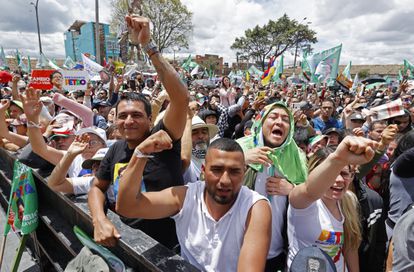Followers of candidate Gustavo Petro, at a campaign event in Soacha this Sunday. Mauricio Dueñas Castañeda (EFE)
The time of the long Colombian electoral campaign is running out.
Just two weeks before the first round of the presidential elections, the image offered by the different polls is more or less the same for more than a month.
The multitude of acts that leads the candidates to wake up at one end of the country and end the day at the other does not seem to have a direct impact on voters at the moment.
Gustavo Petro, the leader of the left, remains in the lead with a support of around 40% of voters, the same for weeks.
His direct rival, the right-wing candidate Federico
Fico
Gutierrez also remains stuck around 22% support.
A fixed photo that, if confirmed at the polls on Sunday, May 29, would send both to the second round and underpins the options of the first over a second.
Fico, former mayor of Medellín, was unknown to much of the country when he launched his candidacy months ago, so he always had a huge margin for growth that has not materialized until now.
The support of Uribism, of the country's business majority and of the economic elites have failed to boost his candidacy above 25% in the polls.
Peter is the complete opposite.
One of the best-known politicians in the country, loved and hated by many, who seems to have his niche of voters well grasped.
His campaign maintains the idea of a possible victory in the first round, although he would need a little more than 10 points above the current image offered by the polls.
The two are now looking for the most difficult vote, that of the undecided, those who have not decided their support and those who still do not know if they will vote.
In this fishing ground, the only one who seems to catch something at the moment is the most indefinable candidate of the campaign.
The former mayor of Bucaramanga Rodolfo Hernández seems to rebound and some surveys have given him up to 16% in voting intention.
Hernández is unknown, although he is supported by a strong anti-corruption discourse that is gaining supporters in a country in which 80% consider that corruption is the biggest of its problems.
The center's candidate also points to that speech, although with less success than Hernández.
Sergio Fajardo seems to be dismounting from the presidential race by failing to exceed 7% in voting intentions in the latest polls.
Second round
The data indicates that the campaign will continue after May 29 on the way to a second round, which will be held on June 19.
There the electoral field turns around with what can be considered the anti-vote.
The support of those who are not supporters of either of the two candidates, but their total rejection of one of them leads them to vote for the other.
Both Fico and Petro, clear examples of a polarized model that has dragged Colombian politics for a long time, are enormous levers of this vote against.
The uncertainty generated by the leader of the left, especially in economic matters, mobilizes the entire right and center right around Fico.
While this, considered by many as more of the same after two decades of Uribe hegemony, moves the disenchanted and those eager for a change to the left.
The question is which anti-vote is greater today.
Four years ago, anti-petrismo far outstripped anti-uribismo.
Colombia was coming out of the second government of Juan Manuel Santos, who had distanced himself enormously from Álvaro Uribe during the peace process with the FARC.
Iván Duque, pupil of the powerful former president and leader of the Democratic Center, gathered around him all those currents willing to stop the possible coming to power of the country's first left-wing president.
Duque won the elections in 2018 with 54% of the vote compared to 42% for Petro.
These four years have changed the scenario.
Duque's government comes to an end with one of the lowest levels of popularity in history.
The pandemic, together with the lack of political action shown by the Executive, have fueled social discontent, increased the demand for political change in the country and have sunk Uribismo (a fall not only attributable to the current president, since he also contributed his mentor with his entanglement in judicial matters).
"The strategy of presenting a candidate who "looks" like a center has not worked because the election is not dominated by a logic of right and left, which previously favored the center-right, but of continuity or change, which favors the left", says columnist Álvaro Forero this Monday in
El Espectador
.
The question now is what is greater.
The fear of some to see Petro in the Casa de Nariño or the fear of others that there will be no change.
A poll published this Monday asks precisely why, who would not vote for.
38% of those surveyed say they would not do it for Fico, compared to 26% who refuse to support Petro.
If there is no victory "first", as Petro's Historical Pact campaign encourages these days, that vote against will end up defining the presidency.
subscribe here
to the
newsletter
of EL PAÍS América and receive all the key information on current affairs in the region.

